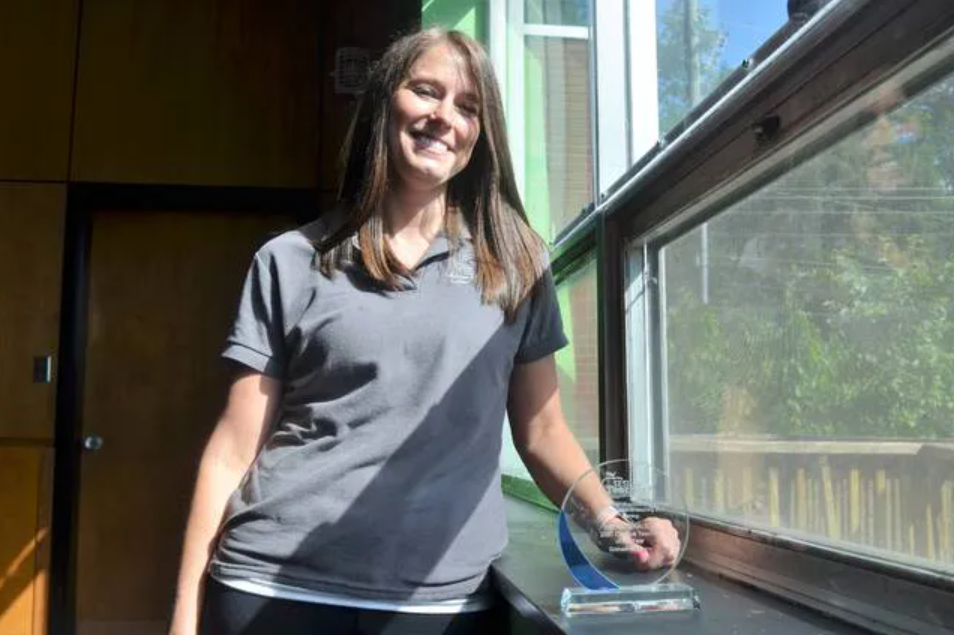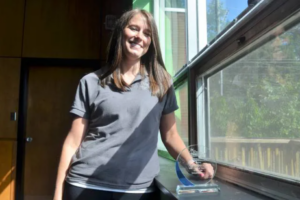‘My kids become a part of me,’ says award-winning Graham Academy teacher

KINGSTON — Brynn Kovalick speaks with disarmingly simple passion about the many roadblocks a teacher overcomes in helping children on the autism spectrum. Disarming because, even as she extols the rewards, a young student lies combative on a hallway floor in the safe and patient hands of a behavior specialist.
“My teaching philosophy is to learn everything about each student,” the 9-year veteran of the Academy staff says. “That’s how you help them, by learning how they learn best and how they understand things.”

Articulating that philosophy became a must after a co-worker nominated her for the regional Teacher of the Year award from Specialized Education Services, Inc. (SESI). The process included submitting an essay. She won the award, and by “regional” they mean best in all of New Jersey, Pennsylvania, and Ohio.
The result of her in-depth approach to the children? “My kids become a part of me, and I see them growing, so I like to be here.”
She works in both autism support and emotional support, and it’s the latter that makes for some difficult personal acceptance.
Non-verbal students present challenges, but the solution is figuring out how they communicate so you can work with them. Those who can communicate but struggle with behavior are a tougher problem.
“The emotional support part is the harder part because you want to teach them how to cope with things, but they need to want to learn how to cope better,” Kovalick says. The big moments are when “the kids have breakdowns and you can’t help them. I take that personally. I take that to heart, because I try to help them, to help something change, and they are not at the point that they are ready to take that change.”
While she’ll work as long as possible to fix any issue in her classroom, when nothing works a behavior team is called to take care of it. “I feel as if I failed, but I didn’t fail. They just aren’t ready to accept.”
The rewards, however, outweigh it all. When she started at the Academy in 2013 teaching younger grades, “the group of kids I had would be in the hallway throwing fits. Now they’ve moved into high school with no behavior problems.
“Seeing the growth is rewarding.”
Yes, she taught through the COVID-19 pandemic shutdown, going online from 9 a.m. to 2:30 p.m., sharing lessons, lunchtime, and a bit more.
“I loved it because we became a part of each other’s lives at home. They got to see my son and my home,” she recounted. “We kept the kids engaged. We got to witness siblings fighting, people in their boxer shorts at home. It was a family online-learning experience.”
The sessions slowly returned to in-person, with students and parents having a choice, but odds are that, thanks to all the school offers in person, if you could you would want to be there. Kovalick left her classroom to talk about her career and the award in the gymnasium, which was set up for an art show that includes an evening for parents to see the works. The Academy also has a talent show and science fair, and a greenhouse the students can use.

“I love what this place is about,” she said. “It’s about getting families involved and showcasing what the students excel at.”
The award from SESI came with a certificate and crystal trophy she intends to display at home. Breakables are not a great choice in a school with children who can exhibit such a wide range of behavioral issues that can emerge with little warning — The fish tank Kovalick keeps in her classroom was cracked once when a student banged his head against it, but don’t worry, he’s fine and even eager to tell the story with a smile — a testament, arguably, to her effectiveness in changing behaviors.
The SESI organization bills itself as a provider of educational services for students requiring that extra attention, partnering with teachers to help run their classrooms. Winning the award led to a school party, a surprise visit by family including her husband and son (who knows the students well and asks about them at home).
“I did get a (financial) bonus,” she notes, “but no day off. That’s what summer is for, to recharge my batteries.” And, she adds, to spend time with her own son.
Kovalick is a graduate of Dallas High School, where a teacher’s suggestion that she would “make a great teacher” took root. She worked her way through post-secondary classes at Keystone College, Misericordia University, and King’s College, the last one convincing her to get into special education after helping students in the King’s early learning center.
Her funniest moment since coming to the Academy, she says, was when a student came in without having done the homework and tried to compensate by giving her a Butterfinger candy bar, her favorite. Word apparently got around; other students have since tried the same ploy.
Asked about the most rewarding moment, she returns to just how compelling the work becomes as you get to know each student.
They all differ, but one universal instant occurs with students who have serious behavior issues. “That moment that they trust you,” she said. “When they calm themselves down and they confide in you. When they take that breath that says ‘I trust you, and I want to listen to you.’”


